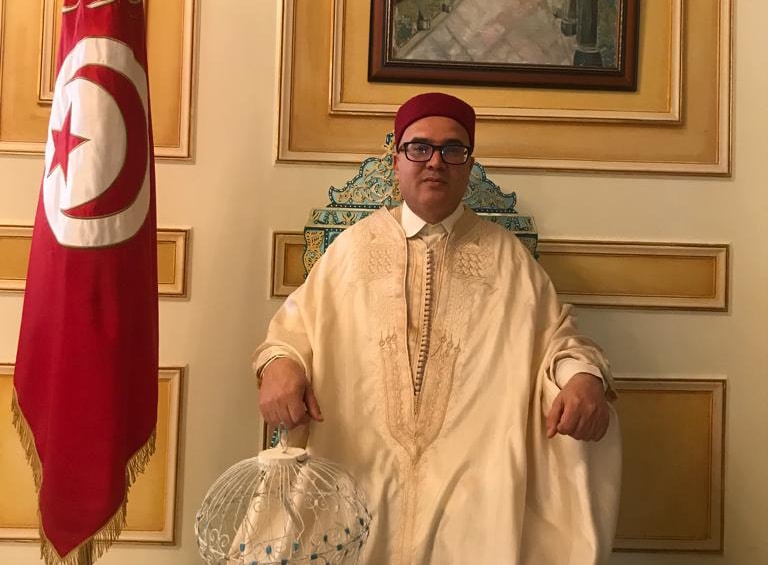By Hachmi Ajili, Ambassador of Tunisia
Talking about Tunisia's relationship with Africa is equivalent to talking about the self. The link is intrinsic and the manifestations of interdependence are multiple. It is geographical by location and ancient by the logic of history. It is also fraternal through social and human bonding and promising in terms of economy, development and future partnership. Tunisia's history with Africa is exceptional, and what could be more symbolic than the fact that the African continent is called by Tunisia's former name ‘Africa’ and ‘Ifriqiya’?
The consecration of the African dimension in the Tunisian identity has its roots in the capsicum civilization, thousands of years ago, when it was the starting point for the human domestication of grazing animals and the mastery of the manufacture of hunting tools, in an environment similar to the forests of the African savannah.
The explorations led by the Carthaginian travelers "Mago and Hanno" towards the Niger basin and the Gulf of Guinea represented fertile ground for human and commercial contacts, which were enhanced during the Islamic domination in Tunisia, where Kairouan, Mahdia, Tunisia, Gabes and the Jerid were the starting point of commercial caravans towards the countries of sub-Saharan Africa, for export and import. The Kairouan Mosque and the Zaytuna University (the oldest university in the world) also played a pioneering role in disseminating the teachings of the true religion, the principles of Maliki jurisprudence and Sufi sects such as the Qadiriyya, Shadhiliyya and Al-Isawiya schools.
These platforms have hosted many African delegations in search of knowledge. One need only look to the countries of sub-Saharan Africa to see that many of their notables and populations wear the Tunisian chachia, which over time has become a symbol of Tunisian and African identity. In turn, Tunisia has drawn on the diversity and richness of African civilization with its authentic customs, which has further strengthened the bonds of kinship and human communication between the peoples of the same continent.
This common cultural heritage prompted the independent Tunisian state, led by Habib Bourguiba, to make the African dimension a priority of its foreign policy, as Tunisia was a pioneer in supporting issues of national liberation and the fight against racial discrimination on the continent, providing the necessary material and diplomatic support. Our country, by virtue of its relations of fraternity and solidarity, has been keen to send several humanitarian missions to maintain peace and security on the continent. Tunisia has been and still is the voice of free Africa and in solidarity with the causes of African peoples aspiring for freedom and development, no wonder when it launched its first official press agency under the name of the "Tunis Afrique Presse" News Agency.
In terms of institution building on the continent, Tunisia was behind the creation of the Organization of African Union and the Agency for Cultural Cooperation (now a Francophone organization with mainly African roots) and has joined several sub-organizations, including COMESA, the African Development Bank and many others. It has also had the honor of hosting the first African Youth Forum and several African summits. Multiple festivals and forums have been devoted to the presentation of African sport, cinema, theatre, literature and other arts. The testimonies of appreciation and admiration echoed by many African leaders such as "Nelson Mandela", "Léopold Sédar Senghor", "Jamal Abdel Nasser", "Kwame Nkrumah", "Ahmed SékouTouré", "Julius Niri Felix", "OvoiBoanyi", "HamaniDiori" and many others for Tunisia, confirms the glorious image my country enjoys and its leading position in the African continent.
Tunisia is seen in many spheres as a gateway to Africa thanks to its cultural weight and its promising economic and technological attractiveness. Tunisian universities play an important role in attracting thousands of African students. Its health, tourism and economic institutions are a favorite destination for African brothers for investment, tourism and healthcare. The rich legal framework that guides Tunisia's relations with various African countries and the mutual economic missions have contributed to the creation of fruitful cooperation and partnership mechanisms that encompass the equipment, transport, subcontracting, agriculture, electricity, gas and various industries sectors.
Since the African orientation is a firm Tunisian conviction, my country has worked to enshrine this dimension in the 2022 constitution and has successfully hosted the activities of the eighth partnership conference between the African continent and Japan and the eighteenth summit of the Francophonie in Djerba, in addition to the distinguished participation in the American-African summit and others, and has insisted on participating in the various UN and international frameworks and forums to defend African issues In this context, I cannot fail to recall President Kais Saied's call for the African continent to be given its right to sustainable development and to participate on an equal footing with all in building the future of humanity, within the framework of a genuine solidarity-based approach that guarantees the rights of the African man and takes into account his aspirations to live decently on the whole of his territory or to organize his immigration in accordance with the laws and the required humanitarian and economic standards.
Tunisia has repeatedly warned against the danger of ignoring the consequences of irregular migration, both for its citizens and for its African brothers, and has also warned against the increase in the activities of human trafficking groups, transnational criminal organizations and terrorist groups, which do not hesitate to sow discord between the peoples of the continent and cast doubt on the unity of belonging and destiny. Tunisia, proud of its African, Arab and Mediterranean membership, is aware that the future of the African continent must be shaped by its people, in the framework of effective cooperation and solidarity with other regional and international groupings. Long live the African brotherhood... Tunisia will always remain faithful to its principles by embracing its African sons and leading the locomotive of development and solidarity across our cherished continent.











